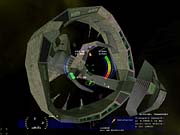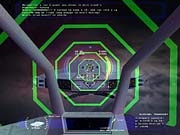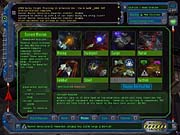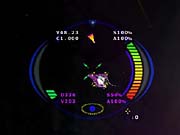The proliferation and popularity of online role-playing games has created a great desire for similar games in other genres. So it was no surprise that many fans of space combat simulations were frustrated and disappointed when Origin Systems canceled its online version of Wing Commander. But these fans should stop complaining--and start installing Jumpgate. Jumpgate is more than just an online space combat game; it successfully incorporates the trading elements of Elite and Privateer, the combat elements of Freespace and Wing Commander, a lighter version of Independence War's realistic physics, and all the level-gaining and experience bonuses that make online role-playing games so addictive.

When you first start out, you might think that such praise is not only unwarranted, but also even misguided. One of Jumpgate's major problems is that the game's opening levels are tedious. Your first ship is slow, you can't effectively engage in combat, and you'll spend the majority of your time going between the few space stations you can travel to with some degree of safety. Unlike in other online role-playing games, you don't even have the benefit of exploring. You're in space, and apart from the occasional pretty nebula, you're going to be staring at inky blackness and holding down the afterburner button for your first 10 hours.
This is a substantial problem, and one that NetDevil, the developer of Jumpgate, has already taken steps to alleviate. It has promised more improvements to the early game, which seems like one of the best things about Jumpgate. In fact, NetDevil seems to have ignored the precedent set by other online game developers--it is not only actively seeking to help players with problems, but also consistently improving and tweaking for the better with every patch.
Once you get past the game's initially slow start, you'll find that Jumpgate offers a great deal of variety. You can play as a fighter, a trader, a miner, or any combination thereof. The economy and political system of the game is completely dynamic, and the actions of players determine everything from the types of equipment available at every station to the attitude of different factions toward one another. It's complex and deep and yet easy to grasp from the get-go.
When you begin, you first choose your faction. There are five groups that make up The Reconstruction Initiative, a tentative alliance of groups under attack by a mysterious alien race known as the conflux. You can join three of these factions: Octavius, Quantar, and Solrain. The other two, Hyperial and Amananth, will require your assistance, but you can't join them. After setting up your account, you board your starter ship and get started on missions.
There are numerous types of missions in Jumpgate, and the mission structure allows for a great deal of flexibility and input on your part. You choose which station you are headed for and what type of mission you'd like, and you'll be assigned one that meets your needs. Missions can include hauling cargo, mining for resources, killing conflux, or transporting important documents from one station to another. There are also faction missions and TRI missions, which benefit your group or the Initiative. These missions are one of the more interesting aspects, as they take a massive group effort to complete. With each, the reward is more than money and experience for those involved. Once a faction mission is completed, new equipment or ships will be available, while TRI missions are used to advance the game's ongoing story.

Each type of mission is crucial to the game. Mining missions are required to provide the basic components needed for production at the different stations. Combat missions keep the trading channels clear. A station cannot produce equipment unless the station has the necessary components, so cargo missions not only give you a bit of money, but also make sure that necessary ship upgrades and weapons are being produced. You can also haul commodities and kill enemies at your own discretion. For instance -- you might really want a certain kind of power plant for your ship, but there aren't any at the Solrain stations where they're produced.
This is just scratching the surface of Jumpgate's intricate production and economic model. There are hundreds of different commodities and equipment types in the game, and the savvy trader can help his faction make sure it has the strongest equipment available, as well as make a bundle in the process.
The political structure is equally dynamic. Attacking another player unprovoked will affect your reputation not only with that player, but also with his faction; plus, it will push your respective factions closer to war. A bounty will automatically be placed on your head, and other players will be rewarded for hunting you down. You can improve your reputation with other factions by completing missions for them, and getting a high political rating with another faction will lower the taxes you pay for commodities at its stations.

It seems very dry in theory, but it's interesting in practice. Every individual player's actions have a noticeable impact on the game, and this makes the universe of Jumpgate seem much more alive than in other massively multiplayer games. Luckily, the community of Jumpgate players, though seemingly small, is helpful and active. Most players are eager to assist those in need or danger, and they're pretty gung-ho when it comes to getting work done for the team.
Players don't have complete control of the game. Though the story has yet to really get going, players who participated in the beta will be more than willing to share war stories of huge in-game battles, faction wars, and game-altering events. NetDevil reportedly has many twists and turns planned for the future, and it will be interesting to see how the already dynamic universe changes over the coming months.
If this sounds more like a role-playing game than a space sim, that's because Jumpgate is very heavily indebted to the online role-playing games that inspired it. You gain experience for completing missions or earning medals, and with enough experience, you gain levels. Gaining levels gives you access to more powerful ships, ship components, and weapons. Eventually, you'll be ready for combat, either against the conflux or other players. Fighting the conflux is what you'd expect from a space combat simulator, and you'll get a good deal of money and a bit of experience for each kill. Fighting other players is another story, and in unregulated space--or if you choose to fly for your faction's Honor Guard--you can kill or be killed without punishment. Player-vs.-player combat is a good way to test your flight skills and pick up some techniques that other pilots have mastered.
There are definitely techniques to fighting and flying. Jumpgate is a bit more complex than your typical space combat simulation in that turning and stopping are based in small part on the actual properties of inertia in a vacuum. You have brakes, which will help slow you down, but learning to control the more powerful ships, especially the enormous cargo ships, can take time. Luckily, Jumpgate includes a simulator that lets you try out any ship with any equipment configuration in a variety of situations.

Fans of space combat simulations will undoubtedly be a bit disappointed by Jumpgate's technical elements. The graphics, while good, are a bit simple and nothing compared with the dramatic visuals of more recent games in the genre. The jumpgates--portals that take you from one sector of space to the next--are nice-looking balls of light. But the rest of the game--ships, stations, and the like--are a bit plain. This is undoubtedly an important part of reducing latency, but it's too bad nonetheless. The sound effects are good if typical, and the music is a good blend of subtle techno and John Williams-inspired grandiosity.
The technical elements are only a slight drawback in a game that is otherwise great. Hopefully, Jumpgate will get the kind of player base required to give the game long-term viability. But if it doesn't, that's through no fault of its own. Jumpgate is a deep, well-designed game that incorporates the best elements of space combat simulations and role-playing games. It's rewarding to those who want to learn the complex interdependencies of the game's universe, as well as to those who just want to get in a spaceship and shoot some things. And it will only get better as the story unfolds, as the political ties weaken, and as the in-game events add new elements to an already fun and interesting game.